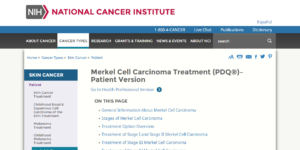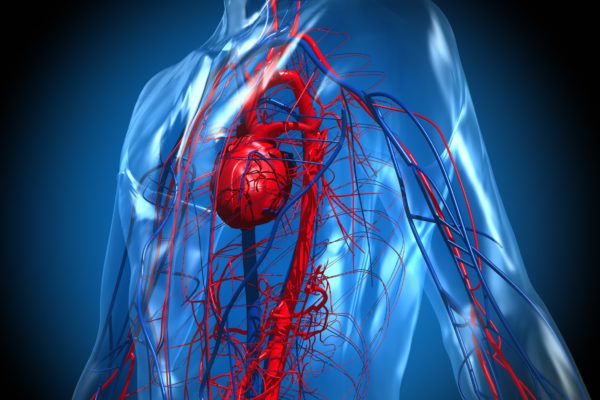
National Cancer Institute – Merkel Cell Carcinoma Treatment (PDQ®)–Patient Version
Merkel cell carcinoma (MCC) is a rare and highly aggressive skin cancer, which, in most cases, is caused by the Merkel cell polyomavirus (MCPyV or MCV). Merkel cells are found in the skin and are associated with sensory nerve endings. They are associated with the sense of touch, specifically low vibrations and deep static touch such as shapes and edges. MCC can occur throughout the entire body, but is most common in the head and neck area.
Merkel cell tumours can display a different growth rate. Some tumours are fast-growing and carry a greater risk of spreading. In around 20% of patients, the cancer recurs after treatment. MCC is a relatively rare cancer type that occurs most frequently in people over 50 years old. The disease affects men and women at an equal scale. The 5-year survival rate for MCC is 77% in stage I, however, 19% of the disease is diagnosed in stage IV.
A Merkel cell carcinoma often appears as a red or purple lump on the skin. Generally ovoid in shape, the lump feels firm but does not cause any pain. Occasionally, a Merkel cell carcinoma is discovered in a lymph node.
About 80% of Merkel cell carcinomas are caused by the MCV virus. MCV-uninfected tumours, which account for about 20% of Merkel cell carcinomas, appear to have a separate and as yet unknown cause, but exposure to ultraviolet light over a longer period of time has been linked to this type of cancer. This rarer type of MCC tends to have extremely high genome mutation rates, due to ultraviolet light exposure, whereas MCV-infected Merkel cell carcinomas have low rates of genome mutation.
Other risk factors:
If a GP suspects a patient may be suffering from Merkel cell carcinoma, they will defer the patient to a dermatologist or a plastic surgeon. They may decide on a biopsy, where a tissue sample is gathered and examined under a microscope. This method also helps determine the stage the cancer has reached.
A Merkel cell carcinoma can metastasise, even though this is a rare occurrence. Imaging technologies, such as ultrasounds, MRI scans, CT scans and PET-CT scans, can help determine this. These tests also help establish the stage the cancer is in. For MCC, four stages are distinguished.
The differentiation of the tumour is an important factor in establishing a prognosis and treatment. This can be determined on the basis of a biopsy. A biopsy involves the removal of a small bit of tissue that can be examined under a microscope. Differentiation determines the degree of mutation in the cancerous cells.
When all research has taken place and a diagnosis has been reached, a team of specialists will come up with a treatment strategy. In the case of MCC, this can involve one or more of the following: surgery, radiation, chemotherapy and immune therapy.
If a patient is diagnosed with a stage I or II cancer, the prevalent treatment is surgery, followed up by radiation. Even though during surgery the tumour is removed including a margin of clean tissue, the cancer often resurfaces in the same spot.
In case of a stage III growth, treatment often involves removal of the tumour – or as much of it as possible – followed by one or more of the following: radiation, chemotherapy and immunotherapy. Metastases in the lymph nodes cannot be surgically removed.
For patients in stage IV, surgery is no longer considered a useful option. Chemotherapy is the first choice, followed by immunotherapy. For patients in a poor physical condition, immunotherapy is tolerated better than chemotherapy.
Immunotherapy for merkel cell cancer involves the use of PD-L1 and CTLA-4 inhibitors. Furthermore, the role of VEGF and kinase inhibitors is an active area of research in relation to this cancer type.





